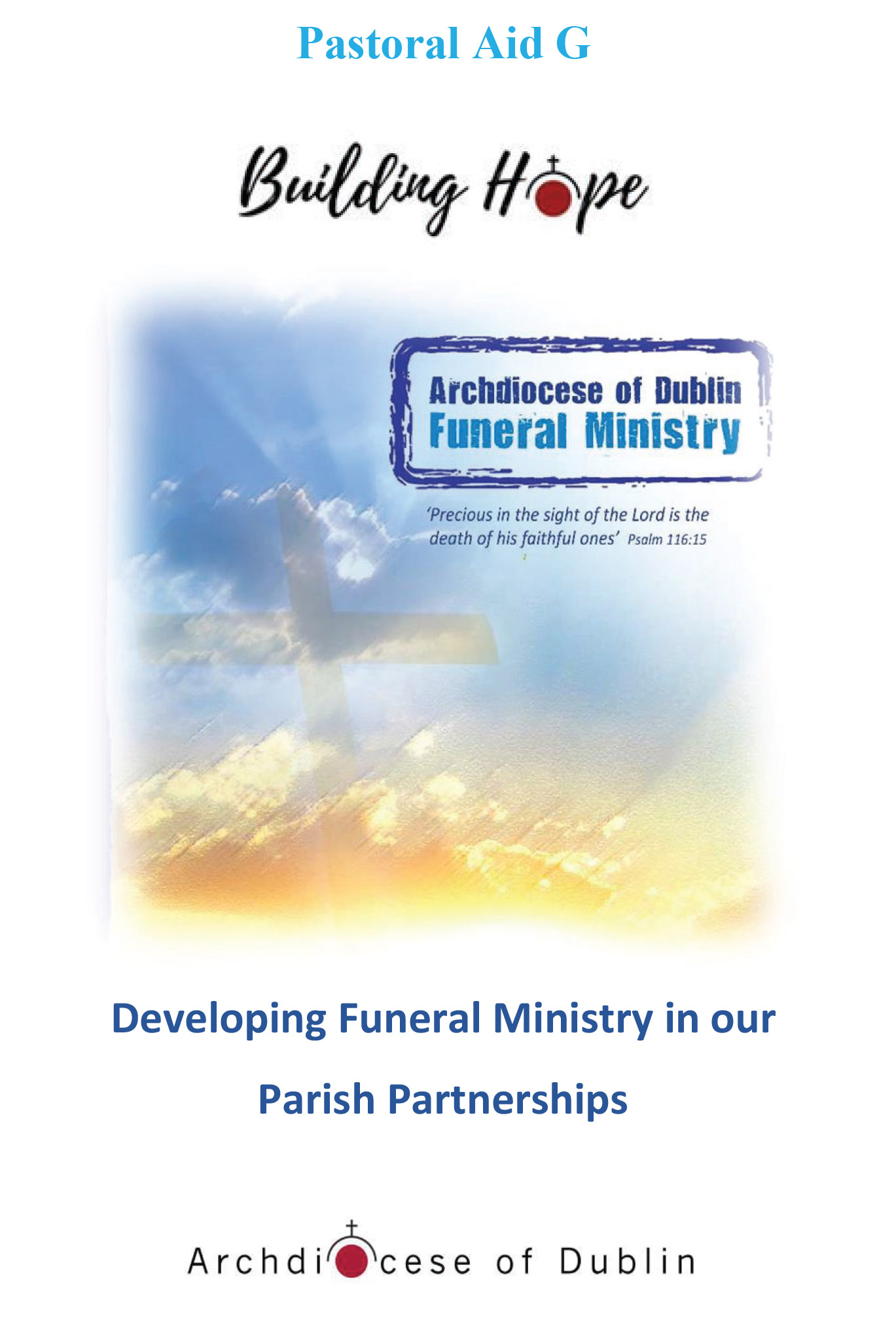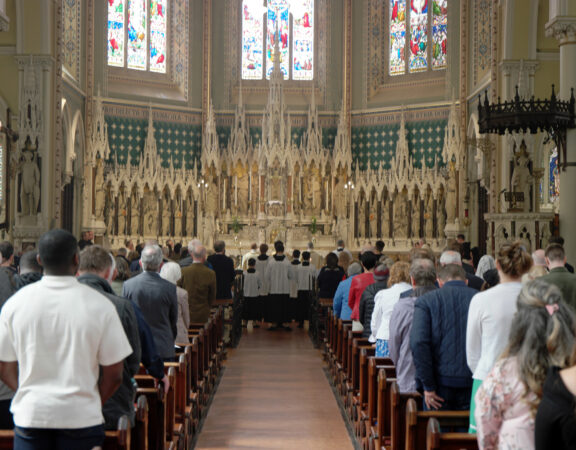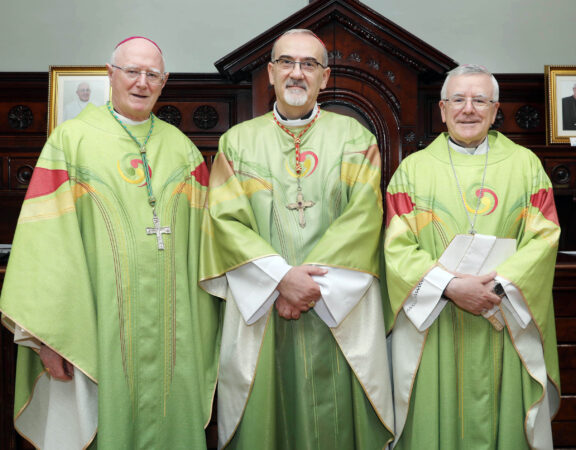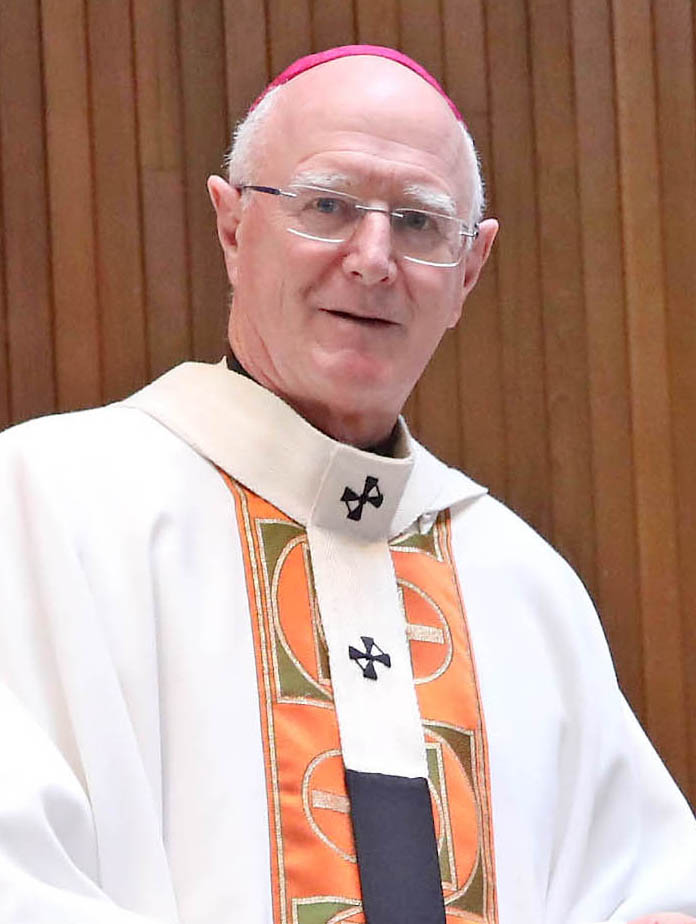
Servants of Consolation and Witnesses of Hope:
Ministry to the Bereaved in a Time of Change
Archbishop Dermot Farrell, Pastoral Letter
November 2023
“The life and death of each of us has its influence on others” – so says Saint Paul in his Letter to the Romans, his pastoral letter to the small Christian communities of Rome (Romans 17:7). In our parishes – our increasingly small Christian communities in the Archdiocese, we see the same reality today. One of the deepest and most authentic expressions of our Christian faith is the celebration of the funeral rites of our departed loved ones. In doing so we both “offer worship, praise, and thanksgiving to God for the gift of a life which has now been returned to God, the author of life” and support the bereaved in their sorrow and loss (see General Introduction of the Order of Christian Funerals, 5).
Support for the bereaved is a very important pastoral outreach. It is much more than a competent service provided for the bereaved to help them negotiate their loss in a dignified way. It is a genuine ministry to our sisters and brothers, in their hour of pain and loss, and, at times, their hour of numbness, confusion or fear, recognising “the spiritual bond that still exists between the living and the dead.” (General Introduction of the Order of Christian Funerals, Introduction, 6). “I was hungry and you gave me food, I was thirsty and you gave me something to drink, I was a stranger and you welcomed me,” says the Lord to those judged to be in right relationship with God, “I was ill and you took care of me, I was in prison and you visited me.” (Matthew 25:35-36). Might we not add, “I was numb with grief and you were there with me, I did not know what to say and you respected my loss, my hopes were shattered and, somehow, peace still came”? Support for the bereaved, the associated prayerful preparation and celebration of the funeral, and our presence at the cemetery or crematorium are an important witness to our shared faith, its consolation, and genuine hope. Nor is the effect of this ministry on us as minsters to be underestimated: to accompany the bereaved, to be closely involved in funerals, to stand at a graveside, are an ongoing call for us to deepen our trust in our Father who has “carved us on the palm of his hand” (Isaiah 49:6), to believe in the promise of Jesus our Lord – that today we “will truly be with him in Paradise” (see Luke 23:43), and to taste the closeness of the Holy Spirit in whom the dead are brought to life (see Romans 8:11). It is to know the embrace of Christ: do dhá láimh, a Chríost, anall tharainn – your two arms around us, O Christ, as we sing in the Irish.
The celebration of worthy, faith-filled funeral liturgies which give genuine expression to the loss and hopes of the bereaved is a highly valued expression of social and spiritual solidarity. In addition, Church funerals are an increasingly important point of contact with many who may be distant from religious practice: in a well-celebrated liturgy, people can not only hear the Good News, but come to experience its healing effect in our lives. It is therefore of critical importance to the pastoral mission of the Church in Dublin that we discern how we may continue to offer this vital service in our rapidly changing diocese and culture.
While it is true that the challenge of sustaining current ways of pastoral and liturgical service varies greatly across the Archdiocese, the question of new, more appropriate, ways of celebrating funerals is not just for those parishes where priests are experiencing greater demands due to a high number of funerals. The pastoral and ministerial reality is that the numbers of clergy and religious will decline very significantly in the near future, so action needs to be taken now in order that adequate pastoral care of the bereaved, and witness to our faith, may be provided across the Archdiocese in the years to come.
However, funeral ministry is not just a matter of organising resources to substitute for priests who are no longer available; support for bereaved families and the wider community, both liturgically and pastorally, is an important opportunity to express the gifts of each of the baptised, which belong to all (see Pope Francis, Evangelii Gaudium, 99). New ways of approaching funeral ministry ask clergy, religious and laity in a parish to engage more broadly and more deeply with families as they are accompanied through the various stages of bereavement in their homes, in funeral homes, as well as in church.
The framework for this new approach to funeral ministry is already in place through the current policy of the Archdiocese, supported by pastoral resources and training programmes which have been developed for funeral teams, including training for lay leaders of funeral services in the absence of a priest or deacon. Many parishes already have significant experience of the work of funeral teams and the generous service of their members. I am now asking that all parishes and parish partnerships give priority to the development of ministry to the bereaved so that what has already begun in some parishes may be better established across the Archdiocese as a whole.
In part, this will involve inviting volunteers for funeral ministry, discerning with them and supporting them through appropriate training and development. Even more importantly, it will involve helping our communities to imagine, understand and experience new ways of ministering to the bereaved. In short, it is nothing less than rediscovery – or in some cases a discovery – of what the Church is, of discovering anew what the Christian community is there for. “If Christ has not been raised, your faith is futile… If for this life only we have hoped in Christ, we are of all people most to be pitied,” as St Paul said to his Corinthian communities (see 1 Corinthians 15:17a, 19). Much more than providing an appropriate scaffolding for grief and loss, ministering to the bereaved has to do with how we understand who and what we are: how we reach out to others, how we are present with and for our neighbour (see Luke 10:36–37), and how we stand alongside each other in the face of death (see Romans 14:8–9). For example, it is already the case that even when priests are readily available to celebrate a funeral Mass, pastoral considerations may suggest that a funeral liturgy without Mass may be more appropriate. Bereaved families need to be supported to discern with the priest and the funeral team what is most appropriate for their situation. Similarly, those who have been formed for funeral ministry need to be supported and encouraged to exercise that ministry, and to be affirmed in the sight of the congregation for the important service which they provide, whether in church or in leading prayers at burial or cremation.
Accompanying this letter is a Pastoral Aid signposting resources which are available to support parish teams, parish pastoral councils and parish partnerships in developing their own approach to this important pastoral ministry.
In this time of great change, we are called to ensure that our ministry and witness can be sustained through a period of wise preparation in which we discover afresh “the restful waters … that revive our drooping spirits.” (Psalm 23:2-3). May the Lord who raised Lazarus to life (John 11:43-44), and restored the widow’s son to his mother at Nain (Luke 11:11-17) inspire our care for our neighbour in their loss, and deepen our trust in the promise and power of his Resurrection: “Whoever lives and believes in me will never die” (John 11:26).
May the prayers of Mary, the Mother of God, who stood by the cross as her son was dying (John 19:25), help those who mourn and be with all of us in our time of need.
I lionta Dé go gcastar sinn – May we be cast into the nets of God.*
+Dermot Farrell
Archbishop of Dublin

* I lionta Dé go gcastar sinn – May we be cast into the nets of God. This prayer, from the early 20th century Irish hymn Ag Críost an Síol, evokes the Parable of the Net in the Gospel of Matthew (13:47-48), a parable that tells of the all-embracing power of God, and that asks us to remember that judgement always remains in God’s hands, within the remit of God’s boundless mercy, and is not circumscribed by the limits of human vision and understanding.
A print-ready PDF of this Pastoral Letter can be found here
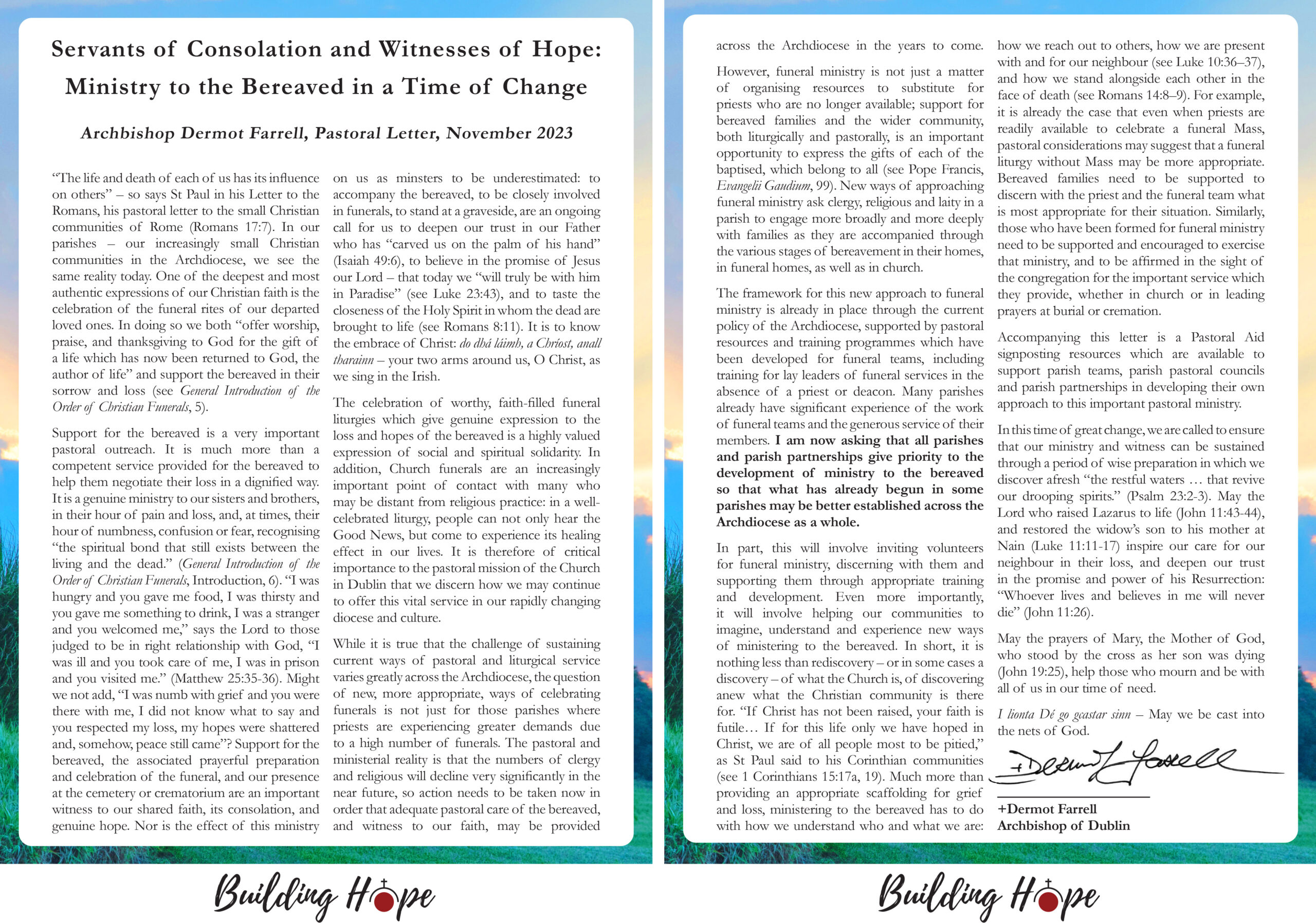
Pastoral Aid G – Developing Funeral Ministry (PDF) can be found here
